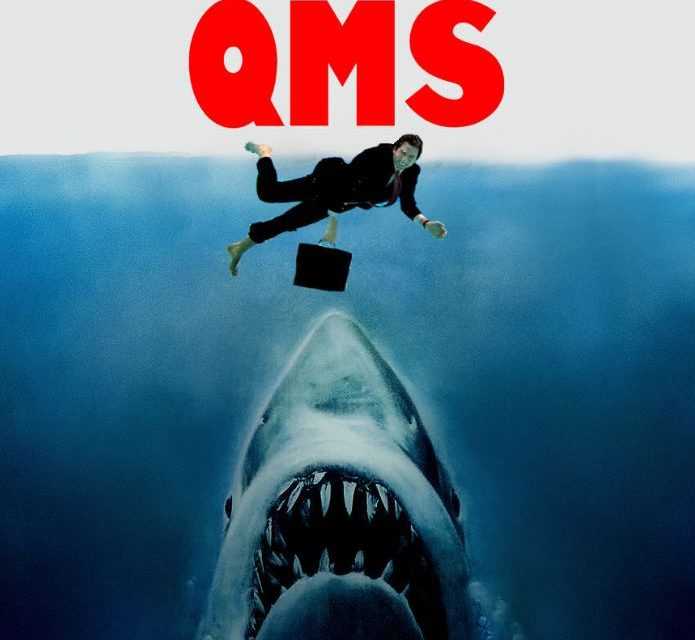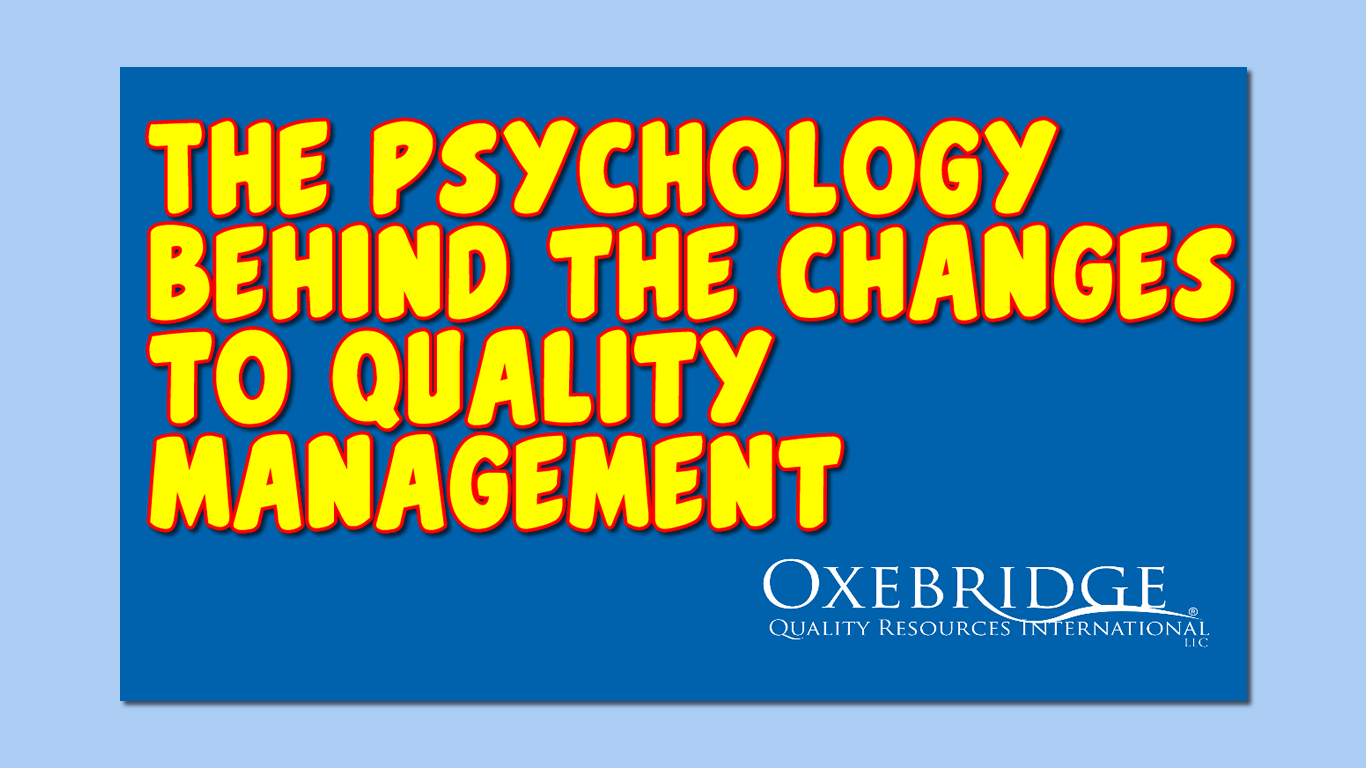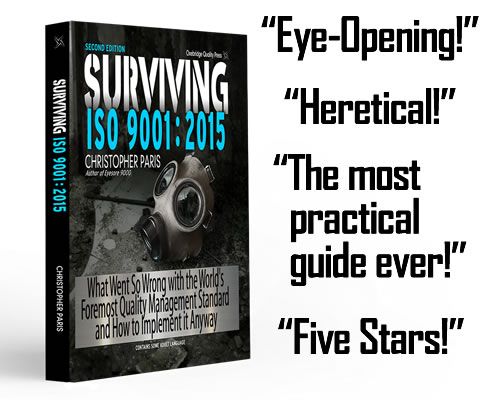 There’s an unprecedented new angle to the dissent being faced by ISO 9001:2015: competition. In years past, ISO 9001 was the only serious QMS standard in the world, having supplanted the endless flood of 2nd party standards from customers and government agencies. In fact, that was one of the promises of ISO 9001: it would replace redundant or competing QMS standards with a single, universally accepted one.
There’s an unprecedented new angle to the dissent being faced by ISO 9001:2015: competition. In years past, ISO 9001 was the only serious QMS standard in the world, having supplanted the endless flood of 2nd party standards from customers and government agencies. In fact, that was one of the promises of ISO 9001: it would replace redundant or competing QMS standards with a single, universally accepted one.
Now, with 9001:2015 looking more and more like a wounded swimmer, the sharks are circling. Multiple alternatives to the standard are cropping up, some from the most unusual places.
First up is the venerable Chartered Quality Institute (CQI) from the UK. The CQI is functionally equivalent to the United States’ ASQ, and normally a tremendous supporter of ISO and its products. But last year, a segment within the CQI — the Integrated Management Group — broke ranks and developed their own QMS standard called MSS 1000:2014. According to CQI representative Ian Dalling, MSS 1000:2014 “can provide a much broader and more objective measure of an organization’s performance including its ability to deliver quality goods and services…. It is a disruptive innovation and as such will be fiercely resisted until the paradigm shift occurs.”
In the US, ISOBiz consultant Godfrey Partridge has published a “business management system standard” built upon ISO 9001 and other requirements, called ISOBIZ 9000:2015-1B. The document was recently pulled from distribution when it was discovered to include the full text of ISO 9001, presumably without permission.
One can’t have a discussion about alternative standards without mentioning certificate mill operator Daryl Guberman, of the self-accredited registrar G-PMC. Not content to merely print certificates to anyone who asks, Guberman has created an onslaught of new standards, for any occasion. These include ARM 9009 for gun manufacturers, VOB 9009 for veteran owned businesses, CAN-9009 for medical marijuana sellers, and CWOB-9009 for woman-owned businesses. He’s got so many, he certifies companies that haven’t even ever seen the standards he audits to.
As has been discussed at length here on the O-site, the American Snow Contractors Association (ASCA) went and created their own ISO 9001 variant, called SN9001, arguing that ISO 9001 was insufficient because of its manufacturing bias, something TC 176 has denied. Said ASCA rep Jim Anderson:
We can’t use the generic ISO [9001] for our industry…it’s largely based on widgets and manufacturing. It is not service related. It doesn’t fit at all. The need to create SN9001 was obvious.
British consultant QG Business Solutions offers some sort of weirdo certification to its own “QG Quality Management Standard,” but they don’t actually provide a link to the standard, so who knows what the hell they are up to.
Over at PRI, the NADCAP process certifications — previously reserved for those tricky “special processes” like plating or welding — have been expanded to encroach into ISO 9001 territory by offering certification for even the simplest machining tasks, like drilling holes. I’m not kidding.
Yours truly launched the M3 Development Council to develop an interlocked set of management system standards that also allowed for grading of the management maturity,” but the project is stuck in development hell as we try to overcome a technical obstacle which will allow the entire planet to contribute to the eventual standards’ development. (If your company would like to volunteer some server bandwidth, reach out.)
 Oscar & Felix, Redux
Oscar & Felix, Redux
Then there’s the problem of decoupling. The automotive industry dodged a bullet by shifting some personalities around and allowing the “let’s align with ISO 9001:2015” team to win out, for now. But there was a while there where a return to a standalone QS9000 standard seemed imminent, and sources tell me some within GM are still irritated enough to be considering a breakaway.
If my sources within IAQG prove correct, AS9100 will decouple from ISO 9001 in about five years, creating a competing QMS scheme within the aerospace industry. In the Texas Tea game, the American Petroleum institute has already abandoned alignment with ISO 9001 for its Spec Q1 quality standard.
Supporters of ISO and various other related bodies are making some noise that none of this is really happening. They insist that people like me, who talk openly about these maneuvers, are doing so to grab attention and sell… well, I have no idea. Logic dictates these schisms are bad for everyone, and there are no winners.
But the evidence is inescapable. TC 176 has made a dramatic misstep by obeying the mandatory dictates of the non-elected, non-consensual ISO Technical Management Board (TMB), and cobbled together a mess of intangible, feel good silliness, while gutting requirements. As always, TC 176 equates being vague with being generic, and the final result appears to be a diluted glop of puddle water. Industries are reacting by abandoning alignment with ISO 9001, and groups are lining up to have an alternative ready. None are likely to succeed within the next decade or two, so we are looking at a grim future filled with contradictory requirements and competing certification schemes.
ISO could, of course, fix this. They need merely take the advice that was given to them a while back, and end their obsession with this 2015 publication date. Pause and reflect, and then create a workable ISO 9001 version that meets the needs of stakeholders and users, rather than out-of-touch dictates of Sophie Clivio’s bureaucratic hellscape, the TMB.
It’s not too late. We can still walk back from this.
Christopher Paris is the founder and VP Operations of Oxebridge. He has over 35 years’ experience implementing ISO 9001 and AS9100 systems, and helps establish certification and accreditation bodies with the ISO 17000 series. He is a vocal advocate for the development and use of standards from the point of view of actual users. He is the writer and artist of THE AUDITOR comic strip, and is currently writing the DR. CUBA pulp novel series. Visit www.drcuba.world








